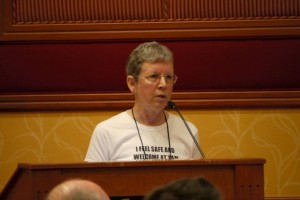Ghaffar Hussain talks to Alom Shaha in The Commentator. Alom’s book The Young Atheist’s Handbook launches tomorrow, or launched yesterday, or last week (launches get confusing – they migrate).
Alom points out that he’s had different experiences from the horsemen, and he wants to show that atheism isn’t just for horsemen. Why promote atheism?
I believe that lots of people only follow a religion because of parental and cultural pressure and that they would be happier if they could be true to themselves and lead godless lives. Belief in god is not something that comes naturally to all of us; many of us find it impossible to believe in god and it can be liberating and life-enhancing to fully embrace this lack of belief and live our lives without religion.
Open the door.


